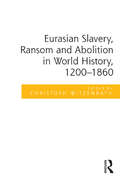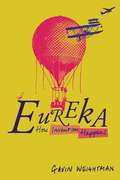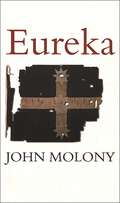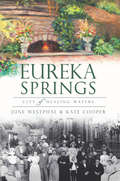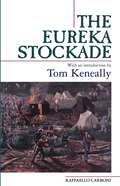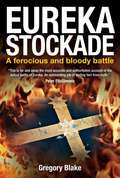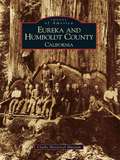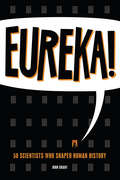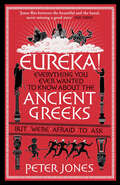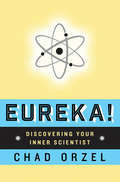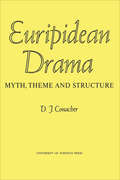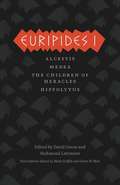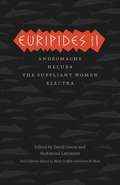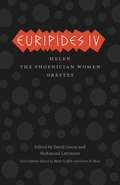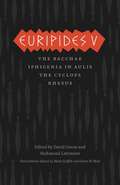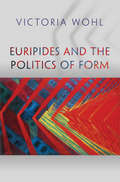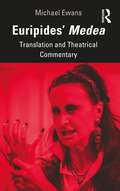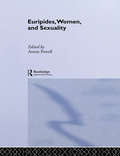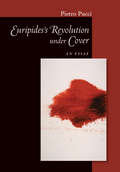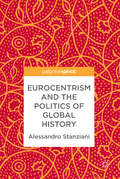- Table View
- List View
Eurasian Empires in Antiquity and the Early Middle Ages: Contact and Exchange between the Graeco-Roman World, Inner Asia and China
by Kim Hyun Jin Vervaet Frederik Juliaan Adalı Selim FerruhThe great empires of the vast Eurasian continent have captured the imagination of many. Awe-inspiring names such as ancient Rome, Han and Tang China, Persia, Assyria, the Huns, the Kushans and the Franks have been the subject of countless scholarly books and works of literature. However, very rarely, if at all, have these vast pre-industrial empires been studied holistically from a comparative, interdisciplinary and above all Eurasian perspective. This collection of studies examines the history, literature and archaeology of these empires and others thus far treated separately as a single inter-connected subject of inquiry. It highlights in particular the critical role of Inner Asian empires and peoples in facilitating contacts and exchange across the Eurasian continent in antiquity and the early Middle Ages.
Eurasian Slavery, Ransom and Abolition in World History, 1200-1860
by Christoph WitzenrathRecent research has demonstrated that early modern slavery was much more widespread than the traditional concentration on plantation slavery in the context of European colonial expansion would suggest. Slavery and slave trading, though little researched, were common across wide stretches of Eurasia, and a slave economy played a vital part in the political and cultural contacts between Russia and its Eurasian neighbours. This volume concentrates on captivity, slavery, ransom and abolition in the vicinity of the Eurasian steppe from the early modern period to recent developments and explores their legacy and relevance down to the modern times. The contributions centre on the Russian Empire, while bringing together scholars from various historical traditions of the leading states in this region, including Poland-Lithuania and the Ottoman Empire, and their various successor states. At the centre of attention are transfers, transnational fertilizations and the institutions, rituals and representations facilitating enslavement, exchanges and ransoming. The essays in this collection define and quantify slavery, covering various regions in the steppe and its vicinity and looking at trans-cultural issues and the implications of slavery and ransom for social, economic and political connections across the steppe. In so doing the volume provides both a broad overview of the subject, and a snapshot of the latest research from leading scholars working in this area.
Eureka
by Gavin WeightmanTracing the long pre-history of five twentieth-century inventions which have transformed our lives, Gavin Weightman reveals a fantastic cast of scientists and inspired amateurs whose ingenuity has given us the airplane, television, bar code, personal computer, and mobile phone. Not one of these inventions can be attributed to a lone genius who experiences a moment of inspiration. Nearly all innovations exist in the imagination before they are finally made to work by the hard graft of inventors who draw on the discoveries of others. While the discoveries of scientists have provided vital knowledge which has made innovation possible, it is a revelation of Weightman's study that it is more often than not the amateur who enjoys the "eureka moment" when an invention works for the first time. Filled with fascinating stories of struggle, rivalry, and the ingenuity of both famous inventors and hundreds of forgotten people, Weightman's captivating work is a triumph of storytelling that offers a fresh take on the making of our modern world. "
Eureka
by John MolonyBefore dawn on 3 December 1854, colonial troopers at Ballarat attacked a group of gold miners who had thrown up a stockade in defiance and defence. Some diggers had guns, but many were unarmed; some twenty of them were killed, along with four troopers. In the decades that followed, the truth of what happened that morning became obscured by partisans on both sides. For many years the Eureka Stockade was regarded as a shameful event and almost forgotten; more recently, it has been celebrated as a righteous stand against injustice. John Molony's Eureka vividly recreates the story of Eureka and unravels the myths that have come to surround it. This new edition of Molony's classic work, now beautifully illustrated with historic Eureka images, will be welcomed by everyone with an interest in the history of Australian democracy.
Eureka Springs
by Annette SnyderWith an excuse of managing inherited property, Ruth Seidle runs from her ruined reputation. She vows to begin a new life without married men, undisclosed lies or destroyed friendships. Who knew her choices include so much of her hidden past? John Vickers buries a history of adultery the day he lays his unfaithful wife to rest and, with his infant daughter in tow, begins life in a better direction void of betrayal and deceit.Can he overlook the past to view the positive side of a bad situation and build a better future for his family? When Ruth crashes into John's life, can she gain faith in her own devices and be the person she promised?Can John put previous experience aside and trust the best is possible even when his heart's involved? Genre: Romance/Historical Fiction (World War II Era)
Eureka Springs: City of Healing Waters
by Kate Cooper June WestphalHow did the unfettered wilderness of the Ozarks, America's early frontier, evolve into a prized health retreat for early pioneers before settling into a beloved historic town? Eureka Springs was founded for the healing properties of the naturally soothing waters, and that special sense of place has always informed the town's history. Yet a complete chronological history from pre-founding to present-day Eureka Springs has never been written--until now. Respected local historians June Westphal and Kate Cooper tell the whole story of Eureka Springs, recounting the important people and major events that shaped this remarkable town tucked in the Ozarks. Learn how these healing springs were formed and how they, in turn, formed the foundation of a community.
Eureka Stockade
by Raffaello CarboniItalian revolutionary Raffaello Carboni reached the Ballarat goldfields in 1853 looking for adventure and wealth. Instead, he found growing unrest among the miners, who were straining against harsh and oppressive government regulations. This unrest came to a head at dawn on 3 December 1854, at the now legendary Eureka Stockade. Here, 120 angry miners revolted against police and soldiers, leaving thirty-five men dead. The courage, resistance to authority and support for democratic freedom displayed by the miners has shaped ideas of Australian nationhood ever since. Raffaello Carboni, an active participant, relates the story behind the myth. His eyewitness account, first published in 1855, vividly and accurately evokes the excitement, drama and horror of the Eureka Stockade, and its aftermath. This new edition of a classic work, supplemented with an introduction by Tom Keneally, is published to coincide with the 150th anniversary of the Eureka uprising.
Eureka Stockade: A Ferocious and Bloody Battle
by Gregory BlakeEureka Stockade: A ferocious and bloody battle, is the epic account of the battle for the Eureka Stockade, an iconic moment in Australian history. On the chilly dawn morning of 3 December 1854 British soldiers and police of the Victorian colonial government attacked and stormed a crudely-built fortification erected by insurgent gold miners at the Eureka lead on the Ballarat Gold Diggings. The fighting was intense, the carnage appalling and the political consequences of the affair profound. This book, for the first time, examines in great detail the actual military events that unfolded during the twenty minutes of deadly fighting at Eureka.
Eureka and Humboldt County: California
by Clarke Historical MuseumThe cry amongst the redwoods-Eureka!-was the shout heard from early pioneers in 1850 as they came to settle in Humboldt County. Discovery of gold permanently changed the area's history, and eventually lead to the extraction of Humboldt's other natural resource: the "red gold" of its forests. Captured here in over 200 vintage photographs is the pictorial history of this bountiful county and its residents.As the gold fever faded in the late 1800s, Humboldt County's primary source of industry became the lumbering of its vast redwoods. Pictured here are the men and machines that felled, transported, and milled the lumber, as well as photographs of the elegant Victorian mansions of the industry's lumber barons, such as William Carson. Weaving the history of Humboldt County together are the stories of its earliest residents, including the Native American tribes, fevered Gold Rushers, the early Chinese community, railroad workers, shipyard sailors, and industrious farming families, all of whom created the foundation it prospers on today.
Eureka!: 50 Scientists Who Shaped Human History
by John GrantGalileo, Einstein, Curie, Darwin, Hawking — we know the names, but how much do we really know about these people? Galileo gained notoriety from his battle with the Vatican over the question of heliocentrism, but did you know that he was also an accomplished lute player? And Darwin of course discovered the principle by which new species are formed, but his bold curiosity extended to the dinner table as well. (And how many people can say they've eaten an owl!) In Eureka! John Grant — author of Debunk It!, Discarded Science, Spooky Science and many others — offers fifty vivid portraits of groundbreaking scientists, focusing not just on the ideas and breakthroughs that made them so important but also on their lives and their various...quirks.
Eureka!: Everything You Ever Wanted to Know About the Ancient Greeks But Were Afraid to Ask
by Peter JonesThe ancient Greeks gave us our alphabet and much of our scientific, medical, and cultural language; they invented democracy, atomic theory, and the rules of logic and geometry; laid the foundations of philosophy, history, tragedy, and comedy; and debated everything from the good life and the role of women, to making sense of foreigners and the best form of government, all in the most sophisticated terms. But who were they? In Eureka!, Peter Jones tells their epic story, which begins with the Trojan War and ends with the rise of the Roman Empire, by breaking down each major period into a series of informative nuggets. Along the way he introduces the major figures of the age, including Homer, Socrates, Plato, Aristotle, Alexander the Great, Euclid, and Archimedes; explores the Greek myths and the role of the gods; provides fascinating insights into everyday life in ancient times; and shows us the very foundations of Western culture. Eureka! is both entertaining and illuminating, and will delight anyone who ever wanted to know more about our ancient ancestors.
Eureka: Discovering Your Inner Scientist
by Chad OrzelEven in the twenty-first century the popular image of a scientist is a reclusive genius in a lab coat, mixing formulas or working out equations inaccessible to all but the initiated few. The idea that scientists are somehow smarter than the rest of us is a common, yet dangerous, misconception, getting us off the hook for not knowing#151;or caring#151;how the world works. How did science become so divorced from our everyday experience? Is scientific understanding so far out of reach for the non-scientists among us? As science popularizer Chad Orzel argues in Eureka, even the people who are most forthright about hating science are doing science, often without even knowing it. Orzel shows that science isn’t something alien and inscrutable beyond the capabilities of ordinary people, it’s central to the human experience. Every human can think like a scientist, and regularly does so in the course of everyday activities. The disconnect between this reality and most people’s perception is mostly due to the common misconception that science is a body of (boring, abstract, often mathematical) facts. In truth, science is best thought of as a process: Looking at the world, Thinking about what makes it work, Testing your mental model by comparing it to reality, and Telling others about your results. The facts that we too often think of as the whole of science are merely the product of this scientific process. Eureka shows that this process is one we all regularly use, and something that everybody can do. By revealing the connection between the everyday activities that people do#151;solving crossword puzzles, playing sports, or even watching mystery shows on television#151;and the processes used to make great scientific discoveries, Orzel shows that if we recognize the process of doing science as something familiar, we will be better able to appreciate scientific discoveries, and use scientific facts and thinking to help address the problems that affect us all.
Euripidean Drama: Myth, Theme and Structure
by Desmond ConacherIt is a commonly held view among historians of Greek literature that with the advent of Euripides the tragic structure, even the tragic outlook of Greek drama suffered a breakdown from which it never recovered. While there is much truth in this opinion, it has tended to put too much emphasis on "Euripides the destroyer" rather than "Euripides the creator." In this study the author's main purpose is to redress the balance and to discuss the structure and techniques of Euripidean drama in relation to its new and richly varied themes.The consistent dramatic form evolved by Aeschylus and Sophocles had grown out of their conception of tragedy as the resultant of the tension between the individual will and the universal order suggested in myth. For Euripides, who never fully accepted myth as the real basis of tragedy, alternate ways of using the traditional material became necessary, and the playwright continually changed his dramatic structure to suit the particular tragic idea he was seeking to express. Viewed in this way, Euripides' dramatic technique may be seen in positive as well as negative terms—as something other than the breakdown of structural technique and mythological insight under the overwhelming force of his ideas. Professor Conacher offers here a new view of Euripides as the first Greek dramatist properly to understand the world of myth, and so, in a sense, to stand a bit outside it. He shows how Euripides, far from being an impatient or incompetent craftsman, used traditional mth as a basis for inventing new forms in which to cast his perceptions of the sources of human tragedy. All the extant Euripidean drama is examined in this book; the result is an intelligent guide to the plays for all students of dramatic literature, as well as a convincing defence of Euripides the creator.
Euripides I
by David Grene Euripides Richmond Lattimore Glenn W. Most Mark GriffithEuripides I contains the plays "Alcestis," translated by Richmond Lattimore; "Medea," translated by Oliver Taplin; "The Children of Heracles," translated by Mark Griffith; and "Hippolytus," translated by David Grene. Sixty years ago, the University of Chicago Press undertook a momentous project: a new translation of the Greek tragedies that would be the ultimate resource for teachers, students, and readers. They succeeded. Under the expert management of eminent classicists David Grene and Richmond Lattimore, those translations combined accuracy, poetic immediacy, and clarity of presentation to render the surviving masterpieces of Aeschylus, Sophocles, and Euripides in an English so lively and compelling that they remain the standard translations. Today, Chicago is taking pains to ensure that our Greek tragedies remain the leading English-language versions throughout the twenty-first century. In this highly anticipated third edition, Mark Griffith and Glenn W. Most have carefully updated the translations to bring them even closer to the ancient Greek while retaining the vibrancy for which our English versions are famous. This edition also includes brand-new translations of Euripides' Medea, The Children of Heracles, Andromache, and Iphigenia among the Taurians, fragments of lost plays by Aeschylus, and the surviving portion of Sophocles's satyr-drama The Trackers. New introductions for each play offer essential information about its first production, plot, and reception in antiquity and beyond. In addition, each volume includes an introduction to the life and work of its tragedian, as well as notes addressing textual uncertainties and a glossary of names and places mentioned in the plays. In addition to the new content, the volumes have been reorganized both within and between volumes to reflect the most up-to-date scholarship on the order in which the plays were originally written. The result is a set of handsome paperbacks destined to introduce new generations of readers to these foundational works of Western drama, art, and life.
Euripides II
by David Grene Euripides Richmond Lattimore Glenn W. Most Mark GriffithEuripides II contains the plays "Andromache," translated by Deborah Roberts; "Hecuba," translated by William Arrowsmith; "The Suppliant Women," translated by Frank William Jones; and "Electra," translated by Emily Townsend Vermeule. Sixty years ago, the University of Chicago Press undertook a momentous project: a new translation of the Greek tragedies that would be the ultimate resource for teachers, students, and readers. They succeeded. Under the expert management of eminent classicists David Grene and Richmond Lattimore, those translations combined accuracy, poetic immediacy, and clarity of presentation to render the surviving masterpieces of Aeschylus, Sophocles, and Euripides in an English so lively and compelling that they remain the standard translations. Today, Chicago is taking pains to ensure that our Greek tragedies remain the leading English-language versions throughout the twenty-first century. In this highly anticipated third edition, Mark Griffith and Glenn W. Most have carefully updated the translations to bring them even closer to the ancient Greek while retaining the vibrancy for which our English versions are famous. This edition also includes brand-new translations of Euripides' Medea, The Children of Heracles, Andromache, and Iphigenia among the Taurians, fragments of lost plays by Aeschylus, and the surviving portion of Sophocles's satyr-drama The Trackers. New introductions for each play offer essential information about its first production, plot, and reception in antiquity and beyond. In addition, each volume includes an introduction to the life and work of its tragedian, as well as notes addressing textual uncertainties and a glossary of names and places mentioned in the plays. In addition to the new content, the volumes have been reorganized both within and between volumes to reflect the most up-to-date scholarship on the order in which the plays were originally written. The result is a set of handsome paperbacks destined to introduce new generations of readers to these foundational works of Western drama, art, and life.
Euripides IV
by David Grene Euripides Richmond Lattimore Glenn W. Most Mark GriffithEuripides IV contains the plays "Helen," translated by Richmond Lattimore; "The Phoenician Women," translated by Elizabeth Wyckoff; and "Orestes," translated by William Arrowsmith. Sixty years ago, the University of Chicago Press undertook a momentous project: a new translation of the Greek tragedies that would be the ultimate resource for teachers, students, and readers. They succeeded. Under the expert management of eminent classicists David Grene and Richmond Lattimore, those translations combined accuracy, poetic immediacy, and clarity of presentation to render the surviving masterpieces of Aeschylus, Sophocles, and Euripides in an English so lively and compelling that they remain the standard translations. Today, Chicago is taking pains to ensure that our Greek tragedies remain the leading English-language versions throughout the twenty-first century. In this highly anticipated third edition, Mark Griffith and Glenn W. Most have carefully updated the translations to bring them even closer to the ancient Greek while retaining the vibrancy for which our English versions are famous. This edition also includes brand-new translations of Euripides' Medea, The Children of Heracles, Andromache, and Iphigenia among the Taurians, fragments of lost plays by Aeschylus, and the surviving portion of Sophocles's satyr-drama The Trackers. New introductions for each play offer essential information about its first production, plot, and reception in antiquity and beyond. In addition, each volume includes an introduction to the life and work of its tragedian, as well as notes addressing textual uncertainties and a glossary of names and places mentioned in the plays. In addition to the new content, the volumes have been reorganized both within and between volumes to reflect the most up-to-date scholarship on the order in which the plays were originally written. The result is a set of handsome paperbacks destined to introduce new generations of readers to these foundational works of Western drama, art, and life.
Euripides V: The Complete Greek Tragedies, Third Edition
by David Grene Richmond Lattimore"Euripides V" includes the plays The Bacchae, translated by William Arrowsmith; Iphigenia in Aulis, translated by Charles R. Walker; The Cyclops, translated by William Arrowsmith; and Rhesus, translated by Richmond Lattimore. Sixty years ago, the University of Chicago Press undertook a momentous project: a new translation of the Greek tragedies that would be the ultimate resource for teachers, students, and readers. They succeeded. Under the expert management of eminent classicists David Grene and Richmond Lattimore, those translations combined accuracy, poetic immediacy, and clarity of presentation to render the surviving masterpieces of Aeschylus, Sophocles, and Euripides in an English so lively and compelling that they remain the standard translations. Today, Chicago is taking pains to ensure that our Greek tragedies remain the leading English-language versions throughout the twenty-first century. In this highly anticipated third edition, Mark Griffith and Glenn W. Most have carefully updated the translations to bring them even closer to the ancient Greek while retaining the vibrancy for which our English versions are famous. This edition also includes brand-new translations of Euripides "Medea," "The Children of Heracles," "Andromache," and "Iphigenia among the Taurians," fragments of lost plays by Aeschylus, and the surviving portion of Sophocles s satyr-drama "The Trackers. " New introductions for each play offer essential information about its first production, plot, and reception in antiquity and beyond. In addition, each volume includes an introduction to the life and work of its tragedian, as well as notes addressing textual uncertainties and a glossary of names and places mentioned in the plays. In addition to the new content, the volumes have been reorganized both within and between volumes to reflect the most up-to-date scholarship on the order in which the plays were originally written. The result is a set of handsome paperbacks destined to introduce new generations of readers to these foundational works of Western drama, art, and life. "
Euripides and the Politics of Form
by Victoria WohlHow can we make sense of the innovative structure of Euripidean drama? And what political role did tragedy play in the democracy of classical Athens? These questions are usually considered to be mutually exclusive, but this book shows that they can only be properly answered together. Providing a new approach to the aesthetics and politics of Greek tragedy, Victoria Wohl argues that the poetic form of Euripides' drama constitutes a mode of political thought. Through readings of select plays, she explores the politics of Euripides' radical aesthetics, showing how formal innovation generates political passions with real-world consequences. Euripides' plays have long perplexed readers. With their disjointed plots, comic touches, and frequent happy endings, they seem to stretch the boundaries of tragedy. But the plays' formal traits--from their exorbitantly beautiful lyrics to their arousal and resolution of suspense--shape the audience's political sensibilities and ideological attachments. Engendering civic passions, the plays enact as well as express political ideas. Wohl draws out the political implications of Euripidean aesthetics by exploring such topics as narrative and ideological desire, the politics of pathos, realism and its utopian possibilities, the logic of political allegory, and tragedy's relation to its historical moment.Breaking through the impasse between formalist and historicist interpretations of Greek tragedy, Euripides and the Politics of Form demonstrates that aesthetic structure and political meaning are mutually implicated--and that to read the plays poetically is necessarily to read them politically.
Euripides' Medea: Translation and Theatrical Commentary
by Michael EwansThis book offers a new, accurate and actable translation of one of Euripides’ most popular plays, together with a commentary which provides insight into the challenges it sets for production and suggestions for how to solve them. The introduction discusses the social and cultural context of the play and its likely impact on the original audience, the way in which it was originally performed, the challenges which the lead roles present today and Medea’s implications for the modern audience. The text of the translation is followed by the 'Theatrical Commentary' section on the issues involved in staging each scene and chorus today, embodying insights gained from a professional production. Notes on the translation, a glossary of names, suggestions for further reading and a chronology of Euripides’ life and times round out the volume. The book is intended for use by theatre practitioners who wish to stage or workshop Medea and by students both of drama, theatre and performance and of classical studies.
Euripides, Women and Sexuality
by Anton PowellEuripides' interest in the psychology and social position of women is well known. Of the great Greek playwrights, he most directly reflects contemporary philosophical and social debates, and his work is of great value as a source for social history.The important new studies in this volume explore Euripides' treatment of sexuality and Greek ideals of women's behaviour. Using a wide range of analytic techniques, seven scholars direct new light not only on Euripides' own views of women but also on the ideals and preoccupations of his contemporaries in this area. Athenian women of the classical period were used, in Plato's phrase, 'to a life in the shadows'. This book helps us to see how far the influence of these cloistered women extended into the sunlit world of men.
Euripides’ Revolution under Cover: An Essay (Cornell Studies in Classical Philology #65)
by Pietro PucciIn this provocative book, Pietro Pucci explores what he sees as Euripides's revolutionary literary art. While scholars have long pointed to subversive elements in Euripides’s plays, Pucci goes a step further in identifying a Euripidean program of enlightened thought enacted through carefully wrought textual strategies. The driving force behind this program is Euripides’s desire to subvert the traditional anthropomorphic view of the Greek gods—a belief system that in his view strips human beings of their independence and ability to act wisely and justly. Instead of fatuous religious beliefs, Athenians need the wisdom and the strength to navigate the challenges and difficulties of life.Throughout his lifetime, Euripides found himself the target of intense criticism and ridicule. He was accused of promoting new ideas that were considered destructive. Like his contemporary, Socrates, he was considered a corrupting influence. No wonder, then, that Euripides had to carry out his revolution "under cover." Pucci lays out the various ways the playwright skillfully inserted his philosophical principles into the text through innovative strategies of plot development, language and composition, and production techniques that subverted the traditionally staged anthropomorphic gods.
Euro Area Monetary Policy in Uncharted Waters
by Martin Čihák Emil Stavrev Thomas HarjesA report from the International Monetary Fund.
Euro Horror: Classic European Horror Cinema in Contemporary American Culture (New Directions in National Cinemas)
by Ian OlneyBeginning in the 1950s, "Euro Horror" movies materialized in astonishing numbers from Italy, Spain, and France and popped up in the US at rural drive-ins and urban grindhouse theaters such as those that once dotted New York's Times Square. Gorier, sexier, and stranger than most American horror films of the time, they were embraced by hardcore fans and denounced by critics as the worst kind of cinematic trash. In this volume, Olney explores some of the most popular genres of Euro Horror cinema—including giallo films, named for the yellow covers of Italian pulp fiction, the S&M horror film, and cannibal and zombie films—and develops a theory that explains their renewed appeal to audiences today.
Eurocentrism and the Politics of Global History
by Alessandro StanzianiGlobal history locates national histories in the context of broader processes, in which the West is not necessarily synonymous with progress. And yet it often suffers from the same Eurocentrism that plagues national history, accepting Western categories and values uncritically and largely ignoring non-English historiographies. Alessandro Stanziani examines these tensions and asks what global history is and ought to be. Drawing upon a wide array of sources, he historicizes global history writing from the sixteenth century onward, tracing the forces of revolution, globalization, totalitarianism, colonization, decolonization and the Cold War. By considering global history in the context of a longue durée, multipolar perspective, this book assesses the strengths and limits of the field, and clarifies what is at stake.

